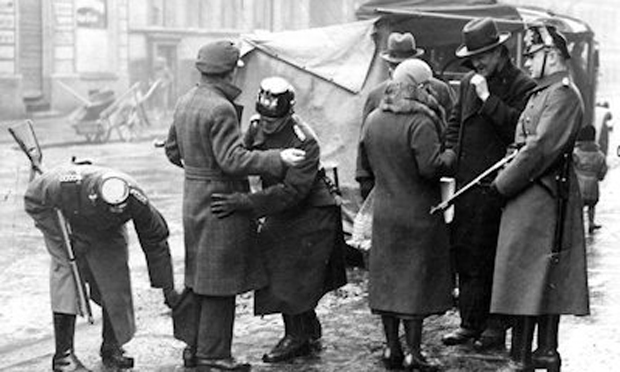New seating chart
Have you ever tried to warn someone about a possible problem or danger, only to have it them ignore it and then have to deal with the consequences? What happened? Why do you think they didn't listen? Alternatively, have you ever ignored advice or a warning? Why? What happened?
In-class reading of Night, chapter 1
Complete study guide questions for chapter 1
Complete vocab sheet for chapter 1
14 point quiz on chapter one content on Tuesday
10 point quiz on chapter one vocab words on Tuesday
Night Discussion
Questions—Preface
1. Why did Elie write
the book? Link these reasons to why
people should study the Holocaust in the first place.
2. Why does Elie say
that “language became an obstacle” (ix) in the writing of this book?
3. “To forget would
be not only dangerous but offensive; to forget the dead would be akin to
killing them a second time” (xv).
Explain this quote. Do you agree
with him? Connect this idea with other
tragedies (soldiers killed in war, 9/11, etc.).
4. Journal Entry: What is one thing that surprised you about
what Elie says in the Preface? Is there
anything that you felt an emotional reaction to? Explore in your journal.
Night Discussion
Questions—Chapter 1
1. Why does Moishe
come back to tell his story? Why do you
think that the townspeople choose to ignore his warning?
2. Explain the irony
in the following statements:
a)
“Well? What did we tell you? You wouldn’t believe us. There they are, your Germans. What do you
say now? Where is their famous cruelty?”
(10).
b) “The yellow star? So what?
It’s not lethal…” (11).
3. Explain the
meaning of the following statement: “The
ghetto was ruled by neither German nor Jew; it was ruled by delusion” (12).
4. How does Weisel’s
narrative style and voice contribute to the effectiveness of his message? Consider the short, clipped sentences,
detached voice, first person narrator, etc.)
5. What is the
symbolic meaning of “night”? Notice its
use in the first chapter (and the chapters that follow).
Night: Vocabulary
Directions: Create an original sentence for each of the 43
vocabulary words from Night. Make sure to underline the word in the
sentence.
32. PROVISIONS
necessary supplies, such as food
33. RAUCOUS
boisterous and disorderly
34. RECESSES
remote, secret places
35. RELENTLESSLY
steadily; persistently
36. SABOTAGE
treacherous action to defeat a cause
37. SURNAME
family name
38. TETHER
the limit of one's resources or endurance
39. THRASH beat; hit
40. TORMENT to cause physical pain or
mental anguish
41. TREATISE written discussion of a topic
42. VITALITY vigor; energy
43. VOID emptiness
|
|
Word
Clue
1. ANECDOTES
short, humorous stories
2. APATHY lack
of emotion or feeling
3. BEREAVED left
alone by death
4. BLANDISHMENTS
coaxing by flattery
5. CONSTRAINT
restrictions
6. CONTAGION a
harmful influence
7. CONVALESCENT
returning to health after an illness
8. CONVOY a
group of vehicles traveling together
9. DEPORTEES
those being expelled from a country
10. DEPRIVE to take
something away from
11. DEVOID
completely lacking or empty
12. DREGS the
least desirable portions
13. ELAPSED
passed
14. EMACIATED
made thin due to starvation
15. EMIGRATION
leaving one area to settle in another
16. ENCUMBERED
hindered; restricted
17. EVACUATION
withdrawing troops or civilians
18. FEEBLE
lacking strength, weak
19. FRENZY
violent mental agitation or wild excitement
20. HERMETICALLY
sealed against the entry or escape of air
21. INSIGNIFICANT
trivial; not important
22. LAMENTATION
grief; mourning
23. LATTER second
of two
24. LIVID ashen;
pallid
25. LUCIDITY
clear understanding
26. MELANCHOLY
sadness; depression
27. MONOCLE an
eyeglass for one eye
28. NOTORIOUS
known unfavorably
29. PESTILENTIAL
likely to cause an epidemic disease
30. PLAINTIVE
expressing sorrow
31. PROFOUNDLY
absolutely; in an unqualified way
Vocabulary: Section 1, pages 3-23
Part
I: Using Prior Knowledge and Context Clues
Below are the sentences in
which the vocabulary words appear in the text. Read the sentence. Use any
clues you can find in the
sentence combined with your prior knowledge, and write what you think the
underlined words mean on the
lines provided.
1. They called him Moshe the Beadle, as though he had never had a surname
in his life.
__________________________________________________________________________________________
2. Nobody ever felt embarrassed by him. Nobody ever felt encumbered
by his presence.
__________________________________________________________________________________________
3. He was a past master in the art of making himself insignificant,
of seeming invisible.
__________________________________________________________________________________________
4. I was twelve. I believed profoundly.
During the day I studied the Talmud, and at night I ran to the synagogue
to weep over the destruction of the Temple.
__________________________________________________________________________________________
5. The train full of deportees
had crossed the Hungarian frontier and on Polish territory had been
taken in charge
by the Gestapo.
__________________________________________________________________________________________
6. At that time, it was still possible to obtain emigration permits
for Palestine.
__________________________________________________________________________________________
7. With some of my schoolmates, I sat in the Ezra Malik gardens,
studying a treatise on the Talmud.
__________________________________________________________________________________________
8. My father was telling them anecdotes and expounding his
own views on the situation.
__________________________________________________________________________________________
9. At dawn, there was nothing left of this melancholy.
__________________________________________________________________________________________
Part II:
Determining the Meaning
Match the vocabulary words to their dictionary definitions.
1. surname A.
hindered; restricted
2. encumbered B.
absolutely; in an unqualified way
3. insignificant C.
short, humorous stories
4. profoundly D.
leaving one area to settle in another
5. deportees E.
sadness; depression
6. emigration F.
written discussion of a topic
7. treatise G.
a family name
8. anecdotes H.
people who are expelled from a country
9. melancholy I. trivial; not important




